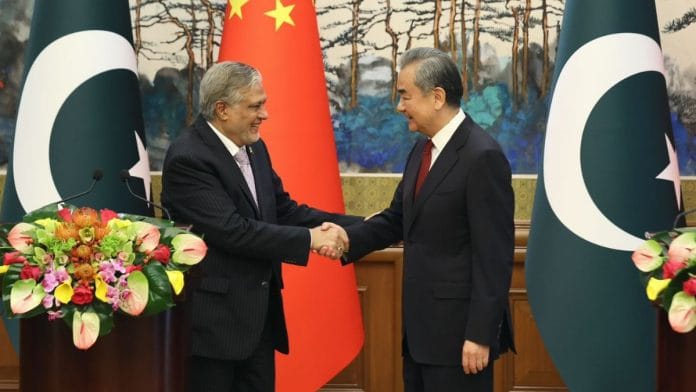New Delhi: China has called for “impartial investigation” into the 22 April terrorist attack in Jammu and Kashmir’s Pahalgam, while urging both India and Pakistan to de-escalate the tensions, following a call between Chinese Foreign Minister Wang Yi with his Pakistani counterpart Ishaq Dar Sunday.
“China supports the prompt initiation of an impartial investigation, emphasising that conflict serves neither the fundamental interests of India and Pakistan nor regional peace and stability, Wang said, noting that Beijing hopes both sides will exercise restraint, move toward each other, and work to de-escalate tensions,” said the Chinese readout of the talks, as published in The Global Times.
It added: “As an ironclad friend and all-weather strategic cooperative partner, China fully understands Pakistan’s legitimate security concerns, and supports its efforts to uphold its sovereignty and security interests.”
The conversation between the two comes as Islamabad is looking to shore up its own diplomatic support, with India having imposed punitive measures on its neighbour following the announcement of cross-border linkages to the terrorist attack last week.
“Expressing deep appreciation for China’s consistent and unwavering support, DPM/FM reaffirmed Pakistan’s strong commitment to the iron-clad Pakistan-China friendship and the shared vision of an All-Weather Strategic Cooperative Partnership. He [Dar] emphasised Pakistan’s determination to further deepen bilateral cooperation across all spheres,” read the statement published by Islamabad on the call between Dar and Wang.
Deputy Prime Minister / Foreign Minister, Senator Mohammad Ishaq Dar @MIshaqDar50, today held a telephone conversation with Member of the Political Bureau of the CPC Central Committee and Foreign Minister of China, Wang Yi.
DPM/FM briefed FM Wang Yi on current regional… pic.twitter.com/rqjJqjyhZP
— Ministry of Foreign Affairs – Pakistan (@ForeignOfficePk) April 27, 2025
On 22 April, at least four gunmen wielding AK47 rifles sprayed bullets at tourists near Pahalgam, leaving at least 26 people, including 25 Indians and one foreign national, dead. The attack is one of the most significant on civilians in Jammu and Kashmir in recent times.
Last week, Indian Foreign Secretary Vikram Misri had announced a number of measures aimed at Pakistan, including holding the Indus Waters Treaty in abeyance, expulsion and annulment of the three defence advisers in Islamabad’s mission in New Delhi, revocation of visas for Pakistani nationals, and closure of the Attari border.
Subsequently, over the next couple of days, Misri briefed a number of top foreign diplomats based in New Delhi of the links between Pakistan and the Pahalgam attack, while Prime Minister Narendra Modi and External Affairs Minister S. Jaishankar spoke to a number of their international counterparts. India has been building its diplomatic case on the attack, receiving strong support from the US and its administration under President Donald Trump. China’s top diplomats in India were also briefed by Indian officials.
Pakistan has also been busy briefing ambassadors in Islamabad. It has rejected any links to the terrorists involved in the Pahalgam attack and announced its own countermeasures, including the closure of Wagah border, calling on Indians to leave the country, as well as reserving the right to hold all bilateral agreements, including the Simla Agreement, with India in abeyance.
Dar, Pakistan’s deputy prime minister and foreign minister, has spoken to a number of his foreign counterparts, including David Lammy, UK’s foreign secretary (who also spoke with Jaishankar), Hakan Fidan, the foreign minister of Türkiye, and Jeyhun Bayramov, the foreign minister of Azerbaijan, to name a few.
(Edited by Mannat Chugh)
Also Read: India builds diplomatic case on Pahalgam as Modi receives calls from at least 16 world leaders






